Chromium is the open source framework Google Chrome is based on. Google doesn’t maintain a stable version of the browser for consumer use because it’s a codebase intended for developers. They look alike, despite some major differences, so we’ll take a closer look at Chromium’s unique features in this Chromium review. 02-2024
Since it’s a template for browser development, it’s missing some of Chrome’s default features and may suffer from glitches, security holes and other flaws. Its availability is limited to legitimate third-party sources – but third parties nonetheless – so be careful where you download Chromium from.
Key Takeaways:
- Chromium is a code base mainly meant for browser developers, not for the consumer browser market.
- There is no official release of Chromium, and it has to be downloaded and updated manually.
- Most major contemporary browsers are based on Chromium, except for Firefox.
Yet another variant of Google Chrome exists called Ungoogled Chromium. This version is a stripped-down version of the already stripped-down Chromium interface because its dependencies on Google infrastructure have been taken out.
In other words, Ungoogled Chromium doesn’t send your data back to Google, because it doesn’t contain any Google code at all. Aside from that, it’s identical to Chromium. This review will focus on Chromium unless otherwise noted.
01/09/2022 Facts checked
Added performance table, updated device synchronization and added other features.
Chromium Review: Alternatives
Chromium Review: Strengths & Weaknesses
Pros:
- Great open source code for browser developers
Cons:
- Poor privacy & security
- No official download source
- Usually slower than Chrome
- Lacks many Chrome features
Features
60 % – Fair
Chromium looks and feels just like Chrome for the most part, but it’s missing some of Chrome’s features, and includes a few extra ones. It’s a testing ground for new technologies before they make it to the final release, so new features come and go, and they are usually rough around the edges.
Chromium vs Chrome: What’s the Difference?
The main difference between Chromium and Chrome is that the former is made for developers while the latter is intended for popular use. Chromium’s status as a developer codebase is evident in its instability and relative lack of features. Be sure to check our Chromium vs Chrome comparison for more.
Perhaps the most significant difference between the two is the inability to sign in to Google from the browser. Logging in to your Google account enables you to synchronize data such as bookmarks and passwords between your devices in Chrome, and is a vital feature for the best browsers today.
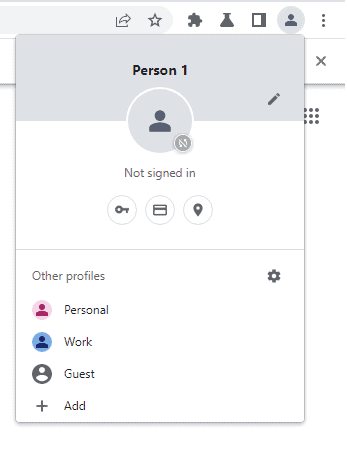
Chromium stores user data locally instead of syncing across devices.
Chromium once supported Google accounts, but in March 2021, Google revoked the APIs that made account sync possible. In its current form, Chromium can accommodate multiple user profiles so that the users can keep their data separate and private, but synchronization is not possible.
The removal of the sync APIs has also disabled a number of other features including geolocation, spell-check, translation and a few others. Other browsers based on Chromium were reportedly affected since the availability of the sync API allowed Chrome data to be transferred to third-party browsers.
Chrome Web Store
Chromium’s compatibility with extensions in the Chrome web store should fill in the holes in the browser’s missing features. You can download ad blockers, translation extensions, social media integrations and anything you would normally add to Chrome.
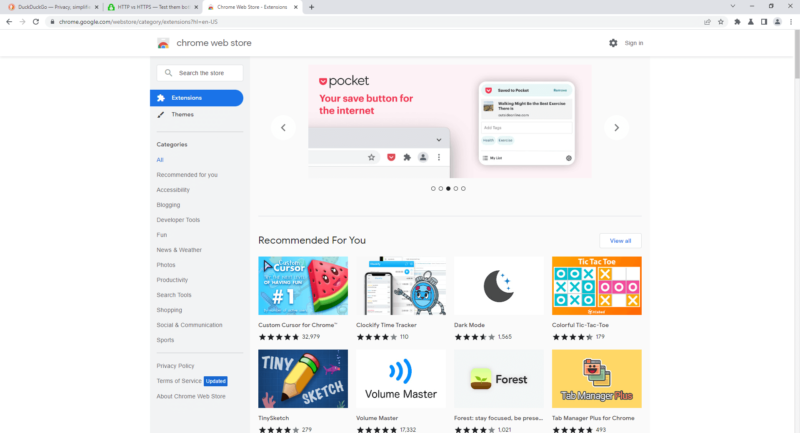
Once you’ve added your favorite extensions, Chromium should look and act just like the fully featured Chrome.
Its compatibility with Chrome extensions is one of Chromium’s most vital features because it enables all Chromium-based browsers to have access to Chrome extensions as well.
Tab Management
Managing your tabs in Chromium is very simple. The tabs shrink as more are added, but there’s a helpful dropdown menu in the omnibar that will show a readable list of all open tabs in case you have too many open at once.
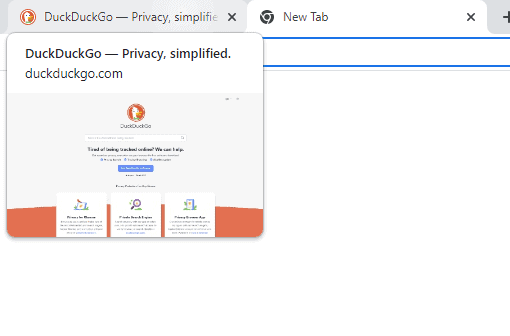
We hope Chromium’s tab previews feature is a sign that it will later appear in Chrome.
Unlike its parent browser, Chromium lacks tab groups, but one unique thing Chromium does have is tab previews. Hover your cursor over a background tab to see a small window with an image of the webpage.
The context menu matches that of Chrome in almost every respect except for the image search feature. Right-clicking on an image in Chrome produces the option to search Google with an image, whereas Chromium has the new “search with Google Lens” feature instead.

Find images on Google with a whole image or with just a small selection of it.
Google Lens will find matching images on the web; it’s similar to the standard Google image search, except you have the option of searching by cropped selections of the image.
Reading List
Chrome and Chromium have slightly different reading lists. The Chromium reading list can be accessed by enabling the side panel, which will display a vertical window on the right side of the screen. Both bookmarks and reading list items can be added to the side panel.
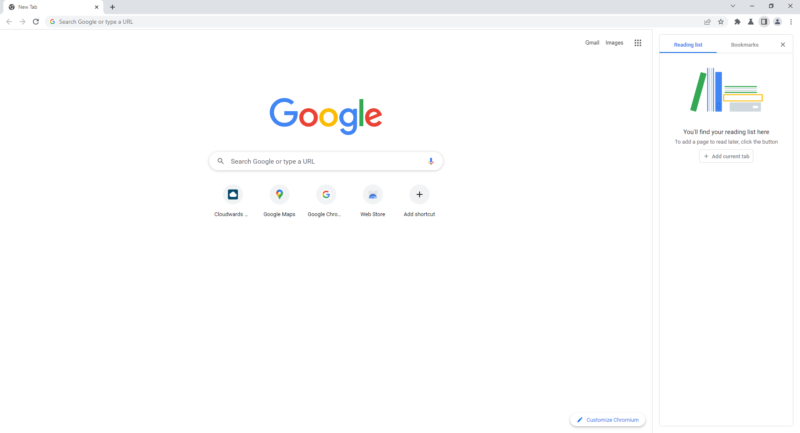
Add pages to your reading list so you can have something to read when you’re traveling while offline.
The reading list is similar to bookmarks, but adding pages to the reading list downloads the page onto your browser, so you can have reading material while you’re offline. Bookmarks establish a new connection to the saved page over the internet, so it doesn’t support offline access.
Ease of Use
50 % – Poor
Chromium can be downloaded on Windows 7 and later, macOS X 10.10 and later, Android 4.4 and later and Linux, but there is no support for iOS devices. The desktop and mobile versions of the browser are identical to each other in almost every way with a few exceptions, as we’ll see below.
Chromium Desktop Version
At first glance, Chromium looks just like Chrome. It exhibits the same minimalist user interface with the tabs and omnibar at the top of the screen, the settings menu at the top right and little else, other than the site itself.

To the average user, Chromium hardly differs from Chrome at all.
Chromium is a user-friendly browser — except when installing and updating it. Installing and updating the browser requires a little extra work than browsers intended for consumer use, but even then, Chromium is missing some basic features included in Chrome.
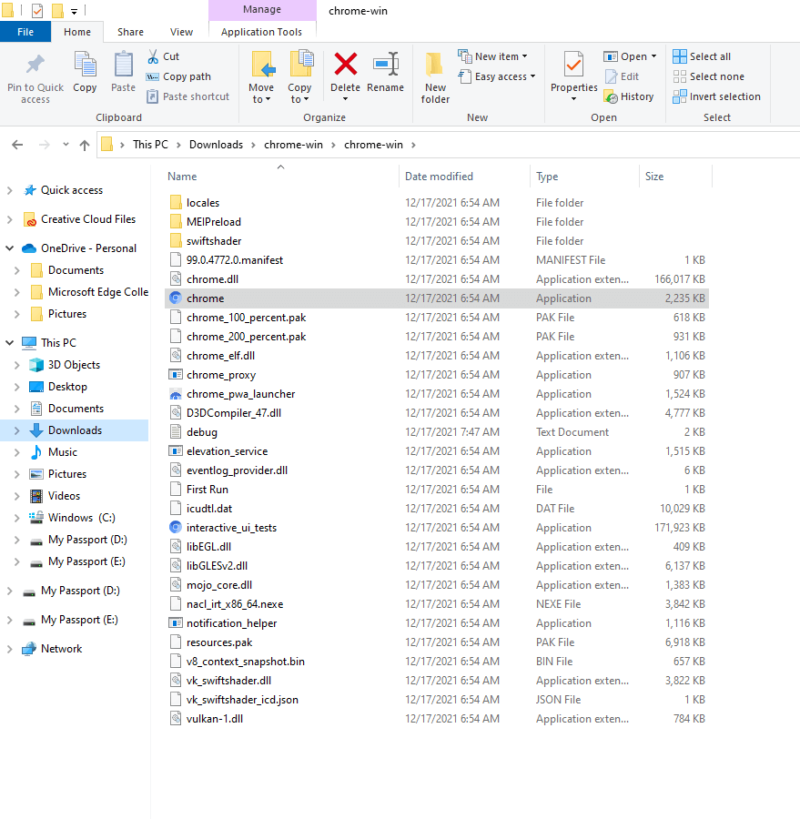
The process of installing Chromium takes some manual effort.
For example, proprietary media codecs like .aac, .h264 and .mp3 don’t come with Chromium by default and have to be manually added; otherwise, you won’t be able to stream media from services like Netflix.
Services that use Google APIs also require manual installation. It’s possible to integrate Google Translate, sync and other services with Chromium, but the API keys must be installed manually before it can work.
Chromium Mobile Version
Downloading and installing Chromium on Android is a pain in the neck because Google provides no official download for the mobile version. You’ll have to download the .apk file manually from a third party, which will trigger a malware warning from your device. Make sure to verify the source before you download the file.

Be careful about downloading Chromium from malicious sources.
It’s an easy browser to use once you’ve successfully installed it. Chromium Android has a simple layout that matches Chrome’s Android interface exactly. Most of the screen is taken up by the web page itself and the omnibar runs across the top. The three dots icon in the top-right corner opens a menu of the usual Chrome settings and options.

Downloading Chromium from a legitimate source will still activate a malware warning.
We recommend erring on the side of caution if you’re still not sure about downloading Chromium. Unless you’re determined to use Chromium, it’s better to install Chrome instead to avoid the risk of downloading malware onto your system.
Performance
60 % – Fair
We put Chromium through three browser speed tests alongside Chrome, Microsoft Edge, Opera, Brave, Vivaldi and Firefox. We received mixed results from Chromium. It was toward the bottom of the results in the Speedometer test, but took second place in JetStream 2, surprisingly outpacing Chrome by a narrow margin. Chromium once again fell behind during the Motion Mark test.
Chromium vs Google Chrome, Mozilla Firefox & Microsoft Edge
Speedometer measures the responsiveness of web applications by simulating user actions and assigns a score based on speed, with higher scores representing faster speeds. Microsoft Edge came in first place for every test we put it through, reaching a score of 131 while Chromium was far behind at only 102. Chrome took second place with a score of 121 (read our Microsoft Edge vs Chrome comparison).
| Benchmark Test: | Speedometer |
|---|---|
| Browser | Runs per Minute |
| Microsoft Edge | 131 |
| Chrome | 121 |
| Opera | 116.6 |
| Brave | 102 |
| Chromium | 102 |
| Vivaldi | 97.3 |
| Firefox | 95.5 |
JetStream 2 measures JavaScript and WebAssembly programming techniques and averages the score with a geometric mean. Chromium performed better on this test than it did on any other with a score of 129.732 — not far behind Microsoft Edge. This is the only test where Chromium outperformed Chrome, and it wasn’t by much.
| Benchmark Test: | JetStream 2 |
|---|---|
| Browser | Score |
| Microsoft Edge | 134 |
| Chromium | 129.732 |
| Chrome | 125.917 |
| Opera | 121.802 |
| Brave | 116.936 |
| Vivaldi | 116.540 |
| Firefox | 80.131 |
Motion Mark tests your browser’s ability to render visual graphics. Chromium was a middleweight performer in this test with a score of 432.50, well behind Edge’s 517 but far higher than Firefox’s 145.93.
| Benchmark Test: | Motion Mark |
|---|---|
| Browser | Score |
| Microsoft Edge | 517 |
| Chrome | 496.32 |
| Brave | 444.67 |
| Chromium | 432.50 |
| Opera | 373.27 |
| Vivaldi | 285.25 |
| Firefox | 145.93 |
As you can see, Chromium is neither a blazing-fast browser nor a particularly slow one. Unline Puffin browser, it works just fine for everyday use and we noticed no latency while browsing the web, sending emails and watching HD videos.
Security
40 % – Terrible
Chromium’s lack of automatic updates exposes users to a greater risk of malware, cyberattacks and other online threats compared with Chrome. The only way to stay on top of Chromium security updates is to manually install them yourself.
Downloading and updating Chromium isn’t a straightforward task because Google relies on third parties to distribute installations of Chromium as executable files. Since you won’t find Chromium in the Google Play Store or any other official channel, it can be easy to mistakenly download a fraudulent copy from a malicious source.

We downloaded Chromium from download-chromium.appspot.com
Aside from the possibility of downloading malware, updating Chromium can become a headache for frequent users because it involves deleting the executable and downloading it again.
Furthermore, Chromium issues updates less frequently and consistently than Chrome. The time between Chromium updates can range anywhere between one and two months, which is far below the standard two- to three-week update cycle of Chrome.
The good news is that Chromium uses Google Safe Browsing to protect users against malicious websites, just like Chrome.
Google Safe Browsing matches the URLs of suspicious websites against a database of known malicious URLs and halts the connection if a malicious web address is detected. However, some users have alleged that GSB sends your data to Google for analysis, as well as to third parties.
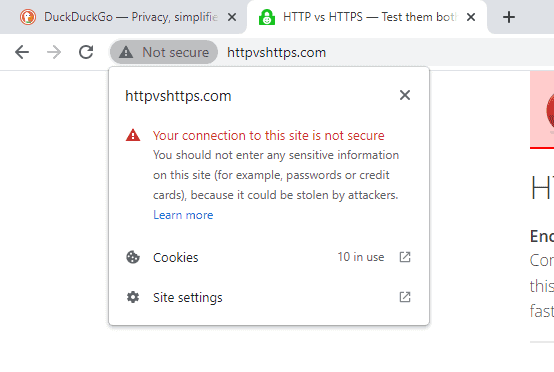
Despite Chromium’s vulnerable nature, it has basic protections like detecting insecure HTTP connections.
Be aware that Google Safe Browsing isn’t available in Ungoogled Chromium, given the nature of the project. While blocking all connection with Google infrastructure provides a major privacy benefit, Ungoogled Chromium users will be more exposed to online dangers without alternate protection in place.
Privacy
10 % – Terrible
Chromium collects about as much of your data as Chrome does. Google Safe Browsing gathers data about the websites you visit for security purposes, and Chromium still uses your data to create personalized ads.
Search predictions and the auto-complete function in online forms requires data collection as well. Whatever you would do in Chrome to mitigate data collection should be done here.
Better yet, use a Chromium-based browser with stronger privacy controls. Check out our list of the most secure web browsers for a selection of more secure alternatives to Chrome and Chromium.
It’s possible to erase some of the data Google collected on you — or better yet, you can prevent Google from recording your search history in the first place. Take a look at our guide for erasing your Google history for more info.
Incognito Mode
Chromium has exactly the same incognito mode as Chrome. None of your browsing history, download history or cookies will be saved while browsing in this mode.

Chromium’s incognito mode will keep your browsing history from being saved.
Incognito mode can come in handy in a variety of different situations, such as keeping your activity and personal data safe from other people using the same device. However, it won’t conceal your IP address from your ISP or the websites you visit.
This common misconception about browser private modes is actually what VPNs do. If you want to have more control over your privacy while using the internet, check out our list of the 10 best VPN providers in 2021. ExpressVPN made it to the top of the list, thanks to its rare combination of strong privacy protections, reasonable long-term plans, fast speed and an abundance of features.
The Verdict
For the non-developer, Chromium is more or less a downgraded version of Chrome that requires some manual work. It has enough features for most users to get by with, but it’s not optimal for the average user — especially when you take its security shortcomings into account.
Chromium isn’t quite as fast as its parent browser, but it’s still a fast and responsive browser for all but the heaviest tasks. It’s missing several key features that Chrome users take for granted in their browser, however, and requires manual installation to fix.
Chromium is not a bad browser overall, but unless you need a foundation for developing a browser of your own, there aren’t many reasons to use Chromium over Chrome.
What do you make of Chromium? Did we overlook any reasons to use Chromium instead of Chrome? Has Chromium aided you in your software development projects? Tell us what you think of our review in the comments section below. As always, thank you for reading.
FAQ
The Chromium browser itself won’t harm your machine as long as you download it from a trusted source. Since it’s intended for developers, it’s less stable and less secure than most browsers, and may put you at a higher risk of a malware infection.
Chromium is intended to be a developer tool rather than a browser designed for consumer use. Therefore, Chromium is not stable and could act in unpredictable ways during use. It also suffers from major security drawbacks.
No, Chromium is a legitimate browser maintained by Google-sanctioned third parties. However, you should be careful where you download Chromium from, as there is no official Google download source.
Chrome is Google’s regularly updated browser for consumer use, while Chromium is an unstable build intended for developers.
Source: https://www.cloudwards.net/chromium-review/